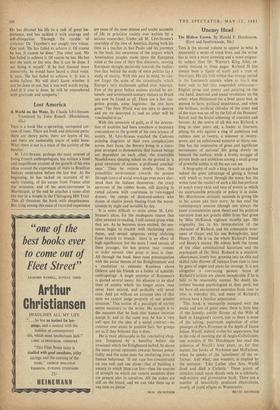Lost America
THIS is a book like a sprawling, variegated car- case of meat. There are fresh and delicious parts; there are chewy parts; there are layers of fat, and there are undeniably tracts of solid bone. What there is not is a trace of the activity of the butcher.
M. Ldvi-Strauss, perhaps the most revered of living French anthropologists, has written a fond and magnificent account of the growth of his own ideas around the experience of visits to Brazilian Indians undertaken before the last war. At the beginning, he has tacked on accounts of his early training, of his escape from France after the armistice, and of his semi-internment in Martinique; at the end he attaches a scene after the war in a temple in the Chittagong Hill Tract. This all threatens the book with shapelessness. But lying among this mass of recorded experience are some of the most intense and tender accounts of life in primitive society ever written by a
serious researcher.. Under all M. Levi-Strauss's
courtship of the idea of America, during both his time as a teacher in Sao Paulo and his journeys in the bush, lies awareness of the impact which Amerindian peoples made upon the European mind at the time of their first discovery, moving European thought decisively towards the realisa- tion that behind the study of mere politics lay a study of society. With this past in mind, he can- not forget the scale of the catastrophe which Europe's very excitement spilled over America. Few of the great Indian nations studied by six- teenth- and seventeenth-century visitors to Brazil can now be found at all. There are a few for- gotten groups, some fugitives: the rest have gone. The New World was not ours to destroy and yet we destroyed it; and no other will be vouchsafed to us.'
With this sensation of guilt, as if the destruc- tion of societies had been somehow a necessary concomitant to the growth of his own science of society, M. Ldvi-Strauss watched the Caduveo painting diagrams of their own complications across their faces, the Bororo living in a town- plan arranged to demonstrate that human beings are dependent on each other, the irresistible Nambikwara sleeping naked on the ground in 'a great sweetness of nature, a profound nonchal- ance.' Then he returns slowly from this palmolithic environment towards the present through layers of social wreckage even more shat- tered than the Indians themselves: the crazy survivors of the rubber boom, still dancing in rotted saloons with courtesans in rain-sogged dresses; the camps of diamond-seekers who dream of elusive jewels blazing from the moun- tainside by night and invisible by day.
It is more difficult to write about M. Levi- Strauss's ideas, for the inadequate reason that after sweated re-reading, I still cannot grasp what they are. As he becomes more excited, the sen- tences begin to crackle with thickening anti- theses, and savant epigrams swing ululating from branch to branch: there is an effect of high significance, but the more I read certain of these passages, the less precise their content or order seemed. One point at least is clear. All through the book there runs preoccupation with the social themes of the Enlightenment and a resolution to reinstate Rousseau above Diderot and his friends as a father of scientific anthropology. A single sentence of Rousseau's is quoted several times: his allusion to an ideal state of society which `no longer exists, may never have existed, and probably will never exist. And yet without an accurate idea of that state we cannot judge properly of our present situation.' This notion of a paradigm of society seems necessary to the writer. He accepts it to the measure that he feels that human societies accept it, and in the same way he has a very soft spot for the idea of a social contract—no contract ever exists in positive fact, but groups act as if they believed that it does.
He is most philosophe in his concluding chap- ters. Tempered by a humility before the irrational which the Enlightened lacked, he shows the same proud optimism towards human poten- tiality and the same taste for unaltering laws of human behaviour. 'If our race has concentrated on one task and one alone—that of building a society in which Man can live—then the sources of strength on which our remote ancestors drew are present also in ourselves. All the stakes are still on the board, and we can take them up at any time we please.'
NEAL ASCII ERSON






































 Previous page
Previous page